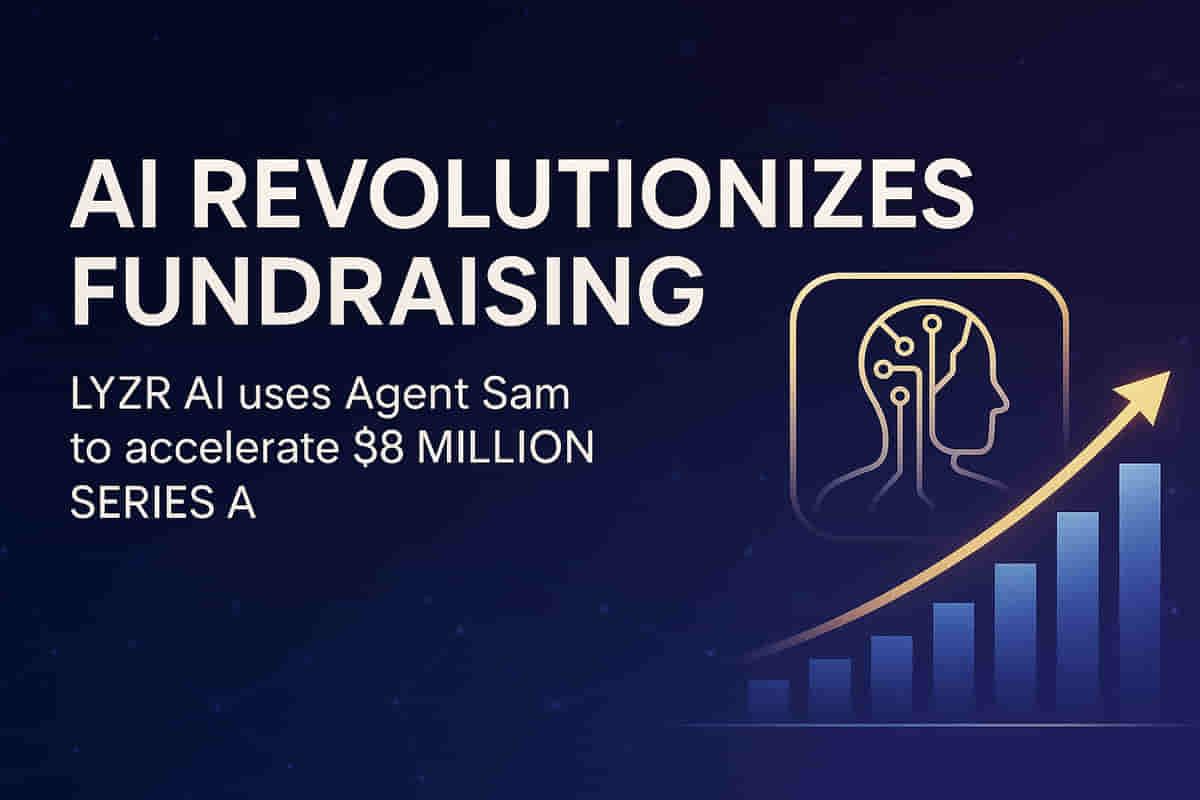AI Startup Lyzr AI Raises $8 Million Series A, With AI Agent Handling Fundraising Groundwork
Tech
|
31st October 2025, 11:41 AM

▶
Short Description :
Detailed Coverage :
Lyzr AI has secured $8 million in Series A funding, a significant move demonstrating how artificial intelligence can transform fundraising processes. A key highlight is the central role played by Lyzr's proprietary AI agent, 'Agent Sam', which automated crucial early-stage tasks such as investor Q&A sessions and initial outreach. This innovative approach reportedly compressed the typical one-month fundraising cycle to just two weeks, showcasing AI's efficiency gains.
The funding round was led by Rocketship.VC, with participation from other notable entities including Accenture and GFT Ventures. As part of this development, Henry Ford III, a director at Ford Motor Company, will join Lyzr's board, bringing valuable operational experience.
The raised capital is earmarked to address a major challenge in enterprise AI: the secure and governed deployment of autonomous AI agents in production environments. Lyzr positions itself as offering a "Third Way" for enterprise AI, balancing the flexibility of open-source solutions with the structure of closed ecosystems. The company emphasizes building essential infrastructure for organizations to deploy AI agents with confidence, ensuring full intellectual property (IP) ownership and avoiding vendor lock-in.
To mitigate risks, particularly in regulated sectors, Lyzr has developed an agent simulation engine. This system, inspired by concepts like Joint Embedding Predictive Architecture (JEPA), allows for extensive testing of AI agents, running thousands of simulations to ensure reliability and compliance before real-world application. The company is also pursuing Organisational General Intelligence (OGI), aiming for interconnected AI agents that collaborate across departments to create a self-improving enterprise system, moving beyond siloed AI copilots. Lyzr aims to reach $7 million in Annual Recurring Revenue (ARR) by February 2026 and plans to introduce an agentic coding interface to simplify AI agent workflow creation.
Impact This development is highly significant for the future of venture capital and enterprise AI adoption, signaling a trend where AI not only performs tasks but also facilitates its own growth and investment. It highlights increased investor confidence in AI-native companies and their ability to innovate rapidly. Rating: 8/10
Difficult Terms: * **Series A funding**: The first major round of financing for a startup, typically after seed funding, used to support expansion and operations. * **AI agent (Agent Sam)**: A software program powered by AI that can perform specific tasks autonomously, interact with systems, and learn from data. Agent Sam handled investor interactions for Lyzr AI. * **Autonomous agents**: AI systems capable of operating independently, making decisions, and executing actions without continuous human oversight. * **Enterprise AI**: Artificial intelligence solutions tailored for large businesses to enhance productivity, automate processes, and derive business intelligence. * **Open-source frameworks**: Software development tools and libraries with publicly accessible source code, allowing for free use, modification, and distribution. * **Closed ecosystems**: Platforms or systems where technology, development, and access are controlled by a single entity, often using proprietary standards. * **IP ownership**: Intellectual Property ownership, referring to legal rights over creations of the mind, such as inventions, literary works, and designs. * **Vendor lock-in**: A situation where a customer is dependent on a specific vendor's products or services and finds it difficult or costly to switch to a competitor. * **Agent simulation engine**: A testing environment that replicates real-world scenarios to evaluate the performance, safety, and reliability of AI agents before their deployment. * **Joint Embedding Predictive Architecture (JEPA)**: A type of AI model architecture that learns by predicting future states and understanding the underlying relationships within data, aiming for more abstract and efficient learning. * **Organisational General Intelligence (OGI)**: A future state where AI systems can understand, reason, and operate across an entire organization's functions, much like human general intelligence applied to business contexts. * **AgentMesh**: Lyzr's platform designed to connect and orchestrate multiple AI agents, enabling them to collaborate. * **Annual Recurring Revenue (ARR)**: A metric representing the predictable revenue a subscription-based business expects to generate over a year. * **Agentic coding interface**: A user interface that allows developers to create complex AI agent behaviors and workflows using natural language instructions rather than traditional programming languages.